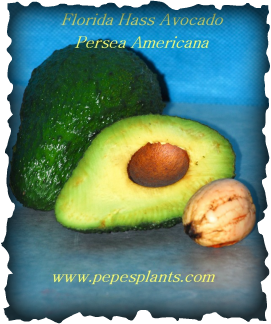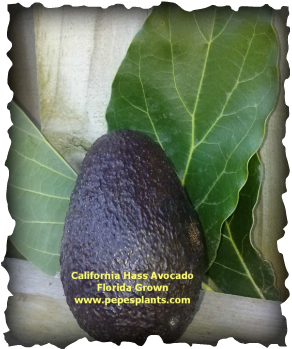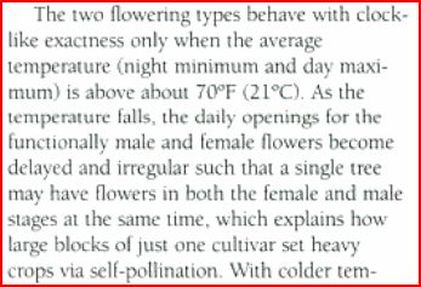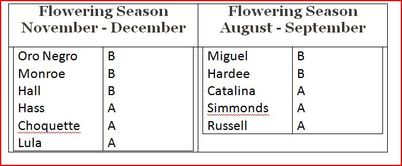Avocado Trees a Quick Introduction
Persea americana
By: Jason "Pepe"
Before finding it's way to Florida the evergreen avocado tree and it's fruit, had a long journey around the world.
The tree originates from Central America. The Aztec indians enjoyed avocado along with a wide range of other fruits and vegetables. The fruit has been cultivated for over 7,000 years.
The avocado was introduced by the Spanish and Portuguese Conquistadors to the Antilles and the Caribbean circa the 1500's. Indonesia was next to meet and greet the avocado around the year 1750 and Florida began to see avocados in the mid 1800's.
The avocado is classified into three races. They are the Mexican, Guatemalan and the West Indian. Today many hybrid varieties exist between these races. The finest avocado trees are often hybrids with a rich history and also displaying superior charecteristics. Each avocado cultivar (Hybrid) has it's own name to reflect the uniqueness of the fruit. We are confident that today's avocado fruit would make an Aztec smile as he or she enjoyed dipping the tortillas into the bowl. How about you? Do you like avocadoes? Read more about the different types below.
Did you know this about the avocado?
In Brazil they make avocado ice cream. Not sure about this one but hey what the heck, I would give it a try!
Tip: Avocado fruit will not ripen on the tree. Fruit does not fall to the ground when ripe. After being picked, a mature fruit will soften within three to seven days. So pick them as needed and enjoy.
Powerful Nutrition: The avocado is high in monounsaturated fat (good fat)
Benefits: Provides you with a rich source of energy and also antioxidants, folate and potassium.
Note: Your Avocado tree will need to be planted in a well drained location and it needs plenty of sunshine! Trees planted in areas that flood will kill the tree in 24 to 48 hours!
The tree originates from Central America. The Aztec indians enjoyed avocado along with a wide range of other fruits and vegetables. The fruit has been cultivated for over 7,000 years.
The avocado was introduced by the Spanish and Portuguese Conquistadors to the Antilles and the Caribbean circa the 1500's. Indonesia was next to meet and greet the avocado around the year 1750 and Florida began to see avocados in the mid 1800's.
The avocado is classified into three races. They are the Mexican, Guatemalan and the West Indian. Today many hybrid varieties exist between these races. The finest avocado trees are often hybrids with a rich history and also displaying superior charecteristics. Each avocado cultivar (Hybrid) has it's own name to reflect the uniqueness of the fruit. We are confident that today's avocado fruit would make an Aztec smile as he or she enjoyed dipping the tortillas into the bowl. How about you? Do you like avocadoes? Read more about the different types below.
Did you know this about the avocado?
In Brazil they make avocado ice cream. Not sure about this one but hey what the heck, I would give it a try!
Tip: Avocado fruit will not ripen on the tree. Fruit does not fall to the ground when ripe. After being picked, a mature fruit will soften within three to seven days. So pick them as needed and enjoy.
Powerful Nutrition: The avocado is high in monounsaturated fat (good fat)
Benefits: Provides you with a rich source of energy and also antioxidants, folate and potassium.
Note: Your Avocado tree will need to be planted in a well drained location and it needs plenty of sunshine! Trees planted in areas that flood will kill the tree in 24 to 48 hours!
Florida Haas & Haas

Haas is the number one commercial variety in California. This tasty Avocado is best known for it's rich nutty flavor and high oil content. Hass Avocados often sell for more than $3.00 each.
The Florida Hass is a separate variety from the California Hass.
Florida Hass is green skin unlike the dark skin Hass of California.
Season:
October – November Flower Type: A
The Florida Hass is a separate variety from the California Hass.
Florida Hass is green skin unlike the dark skin Hass of California.
Season:
October – November Flower Type: A
 California Hass also grows in Florida.
California Hass also grows in Florida.
Fertilizer Recommendations for Avocado Trees in the landscape.
Avocado trees in the landscape are fertilized
with either an 8-3-9-3 or you could use
10-10-10-3 or similar.
Young trees: 1/4 lb every 2 months
Mature trees: 4-6 lbs is applied
4-5 times per year.
Maximum of 25 lbs per year.
Do not fertilize in winter!
|
|
* FDA Disclaimer
The products and statements made about specific plants or products on this web site have not been evaluated by the United States Food and Drug Administration (FDA) and are not intended to diagnose, treat, cure or prevent disease. All information provided on this web site or any information contained on or in any product label or packaging is for informational purposes only and is not intended as a substitute for advice from your physician or other health care professional. You should not use the information on this web site for diagnosis or treatment of any health problem. Always consult with a healthcare professional before starting any new vitamins, supplements, diet, or exercise program, before taking any medication, or if you have or suspect you might have a health problem.
Advertising Disclosure:
Pepesplants.com is a participant in the Amazon Services LLC Associates Program and also Googles affiliate advertising program. The programs provide a means for web sites to earn revenues from advertising and or sales.
Content Disclosure
Use all information on this site at your own risk.
The content here is based on the publishers personal experience in the green industries.
Although every reasonable effort has been made to ensure the accuracy of the information contained on this site, absolute accuracy cannot be guaranteed. This site, and all information and materials appearing on it, are presented to the user "as is" without warranty of any kind, either express or implied
The products and statements made about specific plants or products on this web site have not been evaluated by the United States Food and Drug Administration (FDA) and are not intended to diagnose, treat, cure or prevent disease. All information provided on this web site or any information contained on or in any product label or packaging is for informational purposes only and is not intended as a substitute for advice from your physician or other health care professional. You should not use the information on this web site for diagnosis or treatment of any health problem. Always consult with a healthcare professional before starting any new vitamins, supplements, diet, or exercise program, before taking any medication, or if you have or suspect you might have a health problem.
Advertising Disclosure:
Pepesplants.com is a participant in the Amazon Services LLC Associates Program and also Googles affiliate advertising program. The programs provide a means for web sites to earn revenues from advertising and or sales.
Content Disclosure
Use all information on this site at your own risk.
The content here is based on the publishers personal experience in the green industries.
Although every reasonable effort has been made to ensure the accuracy of the information contained on this site, absolute accuracy cannot be guaranteed. This site, and all information and materials appearing on it, are presented to the user "as is" without warranty of any kind, either express or implied
Site created and managed by Pepe's Fruit Trees. Copyright 2024 - All Right Reserved
Site created and managed by Pepe's Fruit Trees. Copyright 2024 - All Right Reserved







